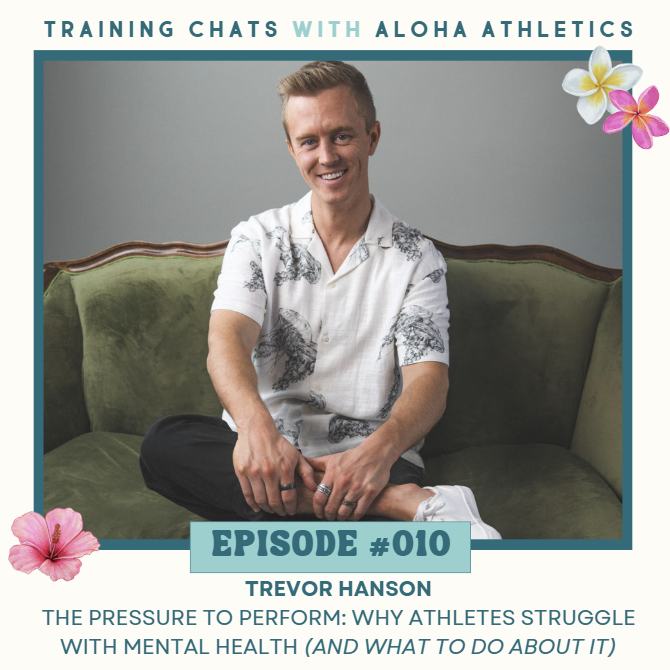The Pressure to Perform: Why Athletes Struggle with Mental Health (and What to Do About It)

Why Mental Health in Sports Matters
Athletes are often praised for their physical endurance, discipline, and ability to push through pain. But what happens when that same drive starts to take a toll on mental well-being? In the latest episode of Training Chats with Aloha Athletics, I sat down with Trevor Hansen, a licensed therapist to explore the emotional struggles that come with high-performance sports—the pressure to always do more, the fear of slowing down, and the identity crisis that can come when we’re forced to stop.
This conversation is deeply personal for me. After finishing the Alabama 650, a nine-and-a-half-day paddling race, which I was raising funds and awareness for She Recovers, a nonprofit focused on women’s mental health, I expected to feel accomplished. Instead, I found myself searching for my next endurance challenge almost immediately. It led me to ask some tough questions: Am I competing for the love of the sport, or am I running from something deeper? This realization opened the door to a mental health journey that many athletes might relate to.
The Hidden Struggles of Athletes
For many athletes, their identity is completely wrapped up in their sport. This can make it difficult to step back, especially when dealing with injuries or forced downtime. The high of competition is real, but so is the post-race low, commonly known as post-race blues or even post-race depression.
Trevor and I discuss how these emotional swings often stem from deeper narratives we develop early in life. Many high achievers—whether in sports or business—grow up believing their worth is tied to performance. If we’re only praised when we succeed, we start to believe that success is the only way to be valuable.
Are You Motivated by Passion or Fear?
One of the most eye-opening parts of our conversation was examining why we push ourselves so hard. Is it because we genuinely love our sport? Or is it because we’re afraid of not being “good enough” without it?
This question hit home for me. After Alabama 650, I had to sit with the uncomfortable truth that I might be using endurance sports as an escape. Instead of processing emotions, I was numbing them with the next big challenge. And I know I’m not alone—many athletes struggle with this exact cycle.
How Athletes Can Support Their Mental Well-Being
Recognizing the problem is the first step, but what can we actually do about it? In the podcast, Trevor and I talk about practical ways to develop a healthier relationship with performance, including:
- Journaling & Self-Reflection – Asking yourself why you feel the need to race or train constantly. What are you really chasing?
- Shifting Your Identity Beyond Sports – Finding value in who you are, not just what you achieve.
- Embracing Rest & Recovery – Understanding that rest isn’t weakness—it’s essential.
- Talking About It – Normalizing mental health discussions within the athletic community.
Mental health in sports is just as important as physical training, yet it’s often overlooked. This conversation with Trevor was a reminder that being strong isn’t just about how much we can endure—it’s also about being willing to slow down, reflect, and ask the hard questions.
If this resonates with you, I encourage you to listen to the full podcast episode. Let’s start normalizing these conversations and supporting each other beyond just race-day success. One of the most powerful ways we can create change is by talking about it openly—so if this episode or blog post spoke to you, share it with a teammate, training partner, or fellow athlete. The more we bring these discussions into the community, the more we can shift the narrative around mental health in sports.
Make sure to subscribe so you don’t miss future episodes, and connect with us on Instagram! You can find me at @earthgrownlindsey,where I share a lot about my own mental health journey, Aloha Athletics @Aloha.athletics, and follow Trevor for more insights on mental health at @theartofhealingbytrevor. Trevor has a program designed to help you unpack these kind of thoughts in Secure Self Club. The Secure self club is designed to provide step-by-step actions to take in real life to help you through situations where anxiety may get in the way. It provides a plan and a structure that shows you, in tangible ways, how to overcome fears and start living with confidence. If this sounds like something you would benefit from head over to https://theartofhealingbytrevor.com/secure-self-club-official-dc to learn more. Trevor also has a free seminar to help you learn an actionable mindset shift and powerful approach for creating self-trust, confidence, and safety within yourself. Mahalo for tuning in and being a part of this vital conversation
February 4, 2025
Aloha
We are Lindsey tilton & casey Mccullough
the team behind Aloha Athletics. Our mission is to empower paddlers of all levels and foster a vibrant, supportive community on and off the water. Lindsey is an endurance athlete and mindset coach passionate about helping others push boundaries. With a background in marathon running and yoga, she blends physical strength with mental focus to help paddlers achieve their goals. Casey is a lifelong athlete with 3 professional skimboarding world championships and the 2021 Crossing for Cystic Fibrosis overall solo champion title. A nutrition and dietetics expert, she’s passionate about helping others thrive by prioritizing mind and body health.
train with us
Transform your paddling experience with expert guidance and customized workouts.
Our holistic approach encompasses technique, speed, power, endurance, and efficiency. Elevate your paddling game with a blend of yoga for flexibility, strength training for power, and mindset training for focus. Join a supportive community, track your progress, and conquer the water with confidence.